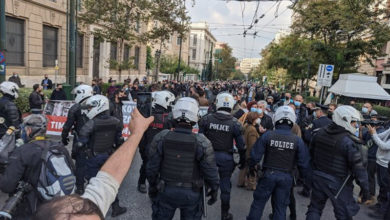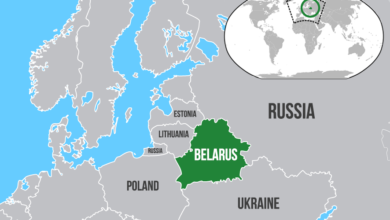It was a scene that has played out many times in the last six years in Greece. Inside parliament, politicians gathered to overwhelmingly approve austerity measures that would deepen the suffering of poor and working people. Outside, tens of thousands gathered to express their outrage under the watch of riot cops. Molotov cocktails were thrown and tear gas filled the air.
There was one key difference this time – the drama played out under a government that identifies itself with the radical left and had promised to tear up the hated austerity memoranda. Standing at the precipice of an exit from the Eurozone, the governing SYRIZA party has splintered and a new mass movement, born of the landslide “no” vote in the referendum, has continued to take up the fight.
The new austerity plan represents a brazen attempt by German imperialism to turn Greece into a neo-colony trapped in an endless cycle of debt and bankruptcy. As we wrote earlier:
“There is a reason the hashtag #thisisacoup became an overnight sensation. German imperialism, using its power within the EU, has essentially taken control over the Greek government. Greece’s sovereignty was placed against the wall by German bankers as they seek to take control of and manage Greece’s economy.”
Click here for background information about the referendum and other recent developments
The country was largely shut down July 15 in the first general strike, called by the civil servants’ union federation, to take place since SYRIZA assumed control of the government at the beginning of this year. Masses of people gathered in towns and cities across Greece, including a very large rally in front of Parliament in Athens’ Syntagma Square. Predictably, the police used the adventurism of a tiny contingent to attack and disperse the entire demonstration.
Actions were held around the world in solidarity with the Greek working class on the same day, including in the United States. Notably, actions also took place in Germany.
The mass outrage and energy of the mobilizations, coupled with the glaring contradiction between the party’s pre-election pledges and the measures it was about to implement, opened up a deep fissure inside SYRIZA. Thirty-two out of its 149 Members of Parliament voted against the new memorandum, and six abstained. These MPs were mostly from the Left Platform faction of SYRIZA, which opposes the leaderships’ policy of keeping the country in the Eurozone at any cost and advocates radical measures like the nationalization of the banking sector.
The Left Platform now finds itself in the contradictory position of supporting the government but opposing its defining program. Energy Minister and Left Platform leader Panagiotis Lafazanis, who voted no to the new memorandum, said while leaving parliament, “We are lawmakers of this government, we support it wholeheartedly. We support SYRIZA in government and we support the Prime Minister. We don’t support the bailout.”
This indicates that the faction will attempt to wage an internal struggle to unseat the current leadership and shift the party’s strategy. A narrow majority of SYRIZA central committee members signed a statement opposing the memorandum, but the internal governing bodies of the party have broken down as major decisions are made by Prime Minister Alexis Tsipras and his circle of advisers.
The new bailout deal is not yet a sure thing – it first has to be approved by other governments in the Eurozone. An emergency loan to cover a large payment to the European Central Bank due on Monday still must be negotiated. While SYRIZA’s leadership attempts to iron out these final details, a major shake-up of the government is likely. Only 124 members of the coalition (which includes the right-wing nationalist Independent Greeks party) voted in favor of the austerity plan, which only passed because all the bourgeois parties with the exception of the fascist Golden Dawn voted yes.
Prime Minister Tsipras is left effectively without a majority in parliament. At the very least, the Left Platform ministers who voted against the memorandum are expected to resign or be fired. There is also speculation about the formation of a “national unity” government that would include other representatives of pro-austerity parties that currently are not in the coalition. In the most drastic scenario, new elections would be called.
In this moment of division and uncertainty at the highest levels of the capitalist state, the intervention of the masses of people can be decisive. The SYRIZA leadership and its right wing allies are weathering this political storm in the hopes of stabilizing the country, but the dreaded “social explosion” Greek ruling class politicians and pundits often refer to could render this a moot point.






